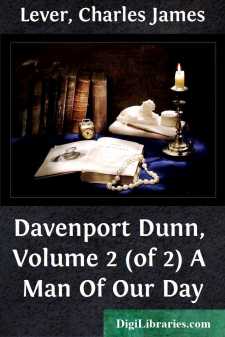Categories
- Antiques & Collectibles 13
- Architecture 36
- Art 48
- Bibles 22
- Biography & Autobiography 813
- Body, Mind & Spirit 142
- Business & Economics 28
- Children's Books 17
- Children's Fiction 14
- Computers 4
- Cooking 94
- Crafts & Hobbies 4
- Drama 346
- Education 46
- Family & Relationships 57
- Fiction 11829
- Games 19
- Gardening 17
- Health & Fitness 34
- History 1377
- House & Home 1
- Humor 147
- Juvenile Fiction 1873
- Juvenile Nonfiction 202
- Language Arts & Disciplines 88
- Law 16
- Literary Collections 686
- Literary Criticism 179
- Mathematics 13
- Medical 41
- Music 40
- Nature 179
- Non-Classifiable 1768
- Performing Arts 7
- Periodicals 1453
- Philosophy 64
- Photography 2
- Poetry 896
- Political Science 203
- Psychology 42
- Reference 154
- Religion 513
- Science 126
- Self-Help 84
- Social Science 81
- Sports & Recreation 34
- Study Aids 3
- Technology & Engineering 59
- Transportation 23
- Travel 463
- True Crime 29
Charles James Lever
Charles James Lever (1806-1872) was an Irish novelist known for his picaresque tales and vivid depictions of Irish life. His best-known works include "Charles O'Malley, the Irish Dragoon" and "Harry Lorrequer," which blend humor, adventure, and social commentary. Lever's novels, often serialized in magazines, gained widespread popularity in the 19th century for their lively characters and engaging narratives.
Author's Books:
Sort by:
CHAPTER I. THE BISHOP'S FOLLY Towards the close of the last century there was a very remarkable man, Bishop of Down, in Ireland: a Liberal in politics, in an age when Liberalism lay close on the confines of disloyalty; splendidly hospitable, at a period when hospitality verged on utter recklessness; he carried all his opinions to extremes. He had great taste, which had been cultivated by foreign...
more...
CHAPTER I. BADEN OUT OF SEASON. A THEATRE by daylight, a great historical picture in the process of cleaning, a ballet-dancer of a wet day hastening to rehearsal, the favorite for the Oaks dead-lame in a straw-yard, are scarcely more stripped of their legitimate illusions than is a fashionable watering-place on the approach of winter. The gay shops and stalls of flaunting wares are closed; the...
more...
CHAPTER I. A MORNING OF MISADVENTURES. "Well, my Lord, are we to pass the day here," said Count Trouville, the second of the opposite party, as Norwood returned from a fruitless search of George Onslow, "or are we to understand that this is the English mode of settling such matters?" "I am perfectly ready, Monsieur le Comte, to prove the contrary, so far as my own poor abilities...
more...
CHAPTER I. HYDROPATHIC ACQUAINTANCES. We are at Como, on the lake—that spot so beloved of opera dancers—the day-dream of prima donnas—the Elysium of retired barytones! And with what reason should this be the Paradise of all who have lived and sighed, and warbled and pirouetted, within the charmed circle of the footlights? The crystal waters mirroring every cliff and crag with intense...
more...
CHAPTER I. THE TELEGRAPHIC DESPATCH When Mr. Davenport Dunn entered the drawing-room before dinner on that day, his heart beat very quickly as he saw Lady Augusta Arden was there alone. In what spirit she remembered the scene of the morning,—whether she felt resentment towards him for his presumption, was disposed to scoff down his pretensions, or to regard them, if not with favor, with at least...
more...
CHAPTER I. The Ortl'er is the Mont Blanc of the Tyrol, and seen from Nauders, a village on a green, grassy table land, more than four thousand feet above the sea, can well bear comparison with the boldest of the Swiss Alps. Nauders itself, a type of a Tyroler village, is situated in a wild and lonely region; it has all the picturesque elegance and neat detail of which Tyrolers are so lavish in...
more...
CHAPTER I. Hôtel des Princes, Paris. It is a strange thing to begin a "Log" when the voyage is nigh ended! A voyage without chart or compass has it been: and now is land in sight—the land of the weary and heart-tired! Here am I, at the Hôtel des Princes, en route for Italy, whither my doctors have sentenced me! What a sad record would be preserved to the world if travellers were but to fill...
more...
PREFACE. An eminent apothecary of my acquaintance once told me that at each increase to his family, he added ten per cent to the price of his drugs, and as his quiver was full of daughters, Blackdraught, when I knew him, was a more costly cordial than Curaçoa. To apply this to my own case, I may mention that I had a daughter born to me about the time this story dates from, and not having at my command...
more...
CHAPTER I. THE THIEVES' CORNER At the foot of the hill on which stands the Campidoglio at Rome, and close beneath the ruins that now encumber the Tarpeian rock, runs a mean-looking alley, called the Viccolo D'Orsi, but better known to the police as the 'Viccolo dei Ladri,' or 'Thieves' Corner'—the epithet being, it is said, conferred in a spirit the very reverse of...
more...
CHAPTER I. THE COTTAGE BESIDE "THE CAUSEWAY" In a little cleft, not deep enough to be a gorge, between two grassy hills, traversed by a clear stream, too small to be called a river, too wide to be a rivulet, stood, and, I believe, still stands, a little cottage, whose one bay-window elevates it above the condition of a laboring-man's, and shows in its spacious large-paned proportions...
more...











